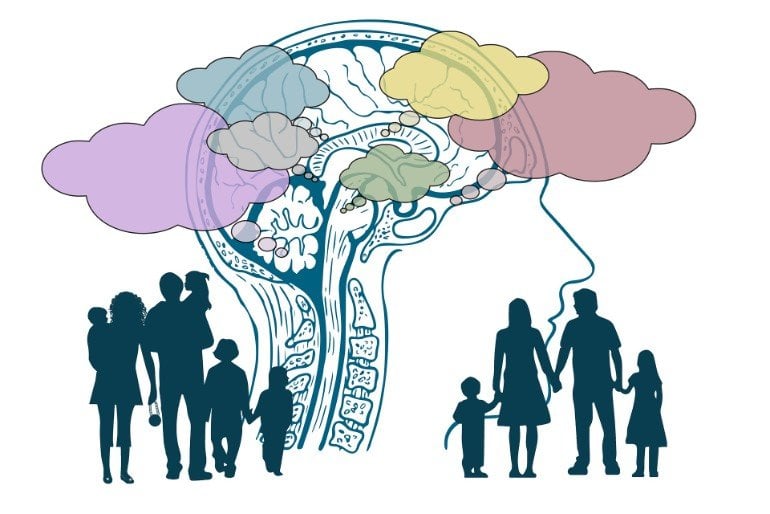Summary: Increased YTHDF3 expression appears to be a key driver in brain metastases.
Source: Virginia Commonwealth University
Approximately 200,000 cancer patients are diagnosed with brain metastases each year, yet few treatment options exist because the mechanisms that allow cancer to spread to the brain remain unclear. However, a study recently published in the journal Cancer Cell by VCU Massey Cancer Center scientist Suyun Huang, M.D., Ph.D., offers hope for the development of future therapies by showing how a poorly understood gene known as YTHDF3 plays a significant role in the process.
Huang is renowned for her work in modeling the spread of cancer to the brain. Her most recent findings show that increased YTHDF3 expression correlates with brain cancer metastases and poor survival outcomes in breast cancer patients. They also demonstrated that the gene is required for multiple steps in the brain metastatic process.
“This study could provide a marker to help doctors diagnose brain metastases early, as well as provide a target for the development of new drugs to prevent and treat brain metastases,” says Huang, a member of the Cancer Biology research program at Massey and professor in the Department of Human and Molecular Genetics at VCU School of Medicine.
Huang’s team discovered that breast cancer brain metastases have increased YTHDF3 gene copy numbers in comparison to primary breast tumors. A gene’s copy number refers to the number of times it appears in the genome. Additional copies of YTHDF3 in metastatic tumor DNA show that mutations have occurred as the cancer cells replicated and spread.
Using a variety of techniques, the researchers profiled the gene to develop a comprehensive view of how it facilitates key processes for brain cancer metastasis through its role in the production of various proteins that interact with the brain microenvironment.

Through these experiments, they found that YTHDF3 contributed to the expression of a number of genes known to drive cancer development, including ST6GALNAC5, GJA1, EGFR and VEGFA. Mouse models lacking the YTHDF3 gene demonstrated prolonged survival and resistance to brain metastasis development.
“Now that we’ve shown how critical this gene is to the development of brain metastases, we plan to work on synthesizing drugs that can inhibit its function,” says Huang. “This is an urgent need, and we’re hopeful this research will eventually help save lives.”
Huang collaborated on this study with Guoquiang Chang, Ph.D., and Peng Li, M.D., both from the Department of Human and Molecular Genetics at VCU School of Medicine; Lei Shi, Ph.D., Shweta Tiwary, Ph.D., Jason Huse, M.D., Ph.D., Lei Huo, M.D., Ph.D., Li Ma, Ph.D., Sicong Zhang, Ph.D., Jianwei Zhu and Lixian Zeng, all from MD Anderson Cancer Center; Victoria Xie from Baylor College of Medicine; Yongjie Ma, Ph.D., from Tianjin Medical Cancer Institute; Youqiong Ye, Ph.D., and Leng Han, Ph.D., from the University of Texas Health Science Center at Houston McGovern Medical School; and Hailing Shi, Ph.D., and Chuan He, Ph.D., from the University of Chicago.
Funding: This research was supported in part by National Institutes of Health grants RM1 HG008935 and 1R01CA198090, the Paul M. Corman, MD, Chair in Cancer research endowment fund, and VCU Massey Cancer Center’s National Cancer Institute Cancer Center Support Grant P30 CA016059.
About this brain cancer research news
Source: Virginia Commonwealth University
Contact: John Wallace – Virginia Commonwealth University
Image: The image is in the public domain
Original Research: Closed access.
“YTHDF3 Induces the Translation of m6A-Enriched Gene Transcripts to Promote Breast Cancer Brain Metastasis” by Huang et al. Cancer Cell
Abstract
YTHDF3 Induces the Translation of m6A-Enriched Gene Transcripts to Promote Breast Cancer Brain Metastasis
Brain metastasis is a major cause of cancer mortality, but its molecular mechanisms are severely understudied. In addition, little is known regarding the role of m6A reader YTHDF3 in human diseases. Here, we show that YTHDF3 overexpression clinically correlates with brain metastases in breast cancer patients. YTHDF3 promotes cancer cell interactions with brain endothelial cells and astrocytes, blood-brain barrier extravasation, angiogenesis, and outgrow. Mechanistically, YTHDF3 enhances the translation of m6A-enriched transcripts for ST6GALNAC5, GJA1, and EGFR, all associated with brain metastasis. Furthermore, overexpression of YTHDF3 in brain metastases is attributed to increased gene copy number and the autoregulation of YTHDF3 cap-independent translation by binding to m6A residues within its own 5′ UTR. Our work uncovers an essential role of YTHDF3 in controlling the interaction between cancer cells and brain microenvironment, thereby inducing brain metastatic competence.






